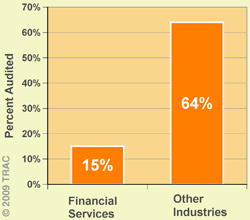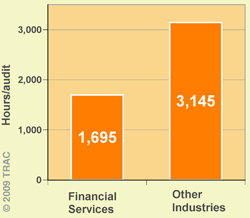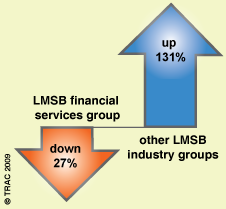IRS Downgraded Large Financial Services Audits
 Newly released data from the IRS show that only 15% of large financial services companies — those with $250 million or more in assets — were audited in 2008, compared with 64% of all other similar sized corporations. And when they were performed, these financial service audits appear to have been less thorough than those in other industries.
Newly released data from the IRS show that only 15% of large financial services companies — those with $250 million or more in assets — were audited in 2008, compared with 64% of all other similar sized corporations. And when they were performed, these financial service audits appear to have been less thorough than those in other industries. In addition, fewer of these audits were being performed by the IRS agency group with special expertise in large financial service corporations, while the number performed by other IRS groups more than doubled since 2004.
You can get the background and data tables in the full report by the Transactional Records Access Clearinghouse. Here are some highlights:
Last year, looking at the largest corporations with assets of $250 million or more, nearly two out of every three returns (64%) filed by large corporations outside of the financial services sector were audited by the IRS. In contrast, for the more than 10,000 of large financial services companies, only 15% of them were audited in FY 2008. As TRAC documented in a 2005 report, the problem is not new. Thus, unlike the situation for the rest of large corporate America, the IRS in recent years has not regularly examined the returns of the large financial services companies.
Less Time Devoted to Financial Service Audits
 When a financial services firm was audited, the thoroughness of the audit — measured by the average hours the auditor spent — also was very different. For example, focusing only on the largest companies audited — those with $20 billion or more in assets — the audit for companies not in the financial sector averaged 3,145 hours of direct examiner time. Despite the unique challenge of understanding derivatives and the like, however, the audits for financial services giants averaged 1,695 hours, about half the time the typical audit took for all behemoths. This was not simply an anomaly; the identical pattern was found for all of the other categories of large corporations.
When a financial services firm was audited, the thoroughness of the audit — measured by the average hours the auditor spent — also was very different. For example, focusing only on the largest companies audited — those with $20 billion or more in assets — the audit for companies not in the financial sector averaged 3,145 hours of direct examiner time. Despite the unique challenge of understanding derivatives and the like, however, the audits for financial services giants averaged 1,695 hours, about half the time the typical audit took for all behemoths. This was not simply an anomaly; the identical pattern was found for all of the other categories of large corporations. Fewer Financial Service Audits Performed by FS Specialists
 Because of the shrinking resources IRS was giving to the auditors in its Financial Services group, there has been a dramatic shift in which industry group is conducting audits of financial services firms. During FY 2004, the Financial Services group conducted most of the audits of the large financial services companies. But during the last five years the actual number of such audits declined by 27%. In contrast, over the same five year period, the audits completed of large financial companies by the four other nonfinancial industry groups more than doubled, up by 131%. The end result: the group that is currently charged with the responsibility for policing the financial services sector is today not conducting the majority of audits of large financial services corporations. This was true even for the largest of the large corporations, those with assets of $20 billion or more.
Because of the shrinking resources IRS was giving to the auditors in its Financial Services group, there has been a dramatic shift in which industry group is conducting audits of financial services firms. During FY 2004, the Financial Services group conducted most of the audits of the large financial services companies. But during the last five years the actual number of such audits declined by 27%. In contrast, over the same five year period, the audits completed of large financial companies by the four other nonfinancial industry groups more than doubled, up by 131%. The end result: the group that is currently charged with the responsibility for policing the financial services sector is today not conducting the majority of audits of large financial services corporations. This was true even for the largest of the large corporations, those with assets of $20 billion or more.Labels: audits, financial services, IRS, taxes, TRAC

